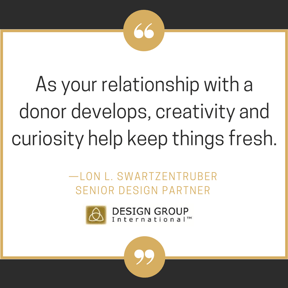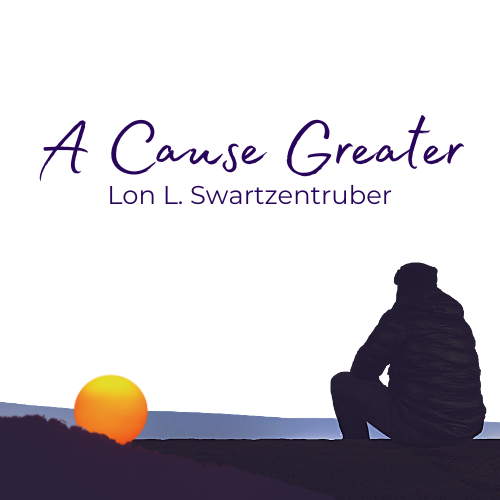Over the past several months we’ve been talking about relationships, in particular how to initiate, develop, and sustain relationships with donors.
Just like any relationship, keeping donor relationships going requires special attention. Over the years, I’ve found three things to be particularly helpful:
- Learn about donors’ interests.

- Be creative and curious.
- Talk about things that matter.
Learn about donors’ interests
A while back a donor gave me a call and asked if I would be interested in joining her and her son at a fundraising event for one of her favorite charities. She had an empty seat at the table she was hosting. It was a touching gesture, and I gladly accepted the invitation.
We had a riot! A whole new side of her came to light through our conversation, and it gave me a much better picture of the depth and breadth of her philanthropy. In the process, I also learned a lot about her life and her family.
Joining her at the event gave us the opportunity to talk about something other than the organization I represented. It was a fun and insightful experience that helped our relationship to progress and flourish.
Be creative and curious
As your relationship with a donor develops, creativity and curiosity help keep things fresh.
When you’re preparing for a donor visit, ask yourself questions like these:
- When I last saw this person, what did we do? What did we talk about?
- What might we do that is new or different?
- What aspects of the organization’s mission have we not discussed yet?
During the visit, taking a posture of curiosity also helps ensure that your relationship doesn’t go stale. Ask questions like these:
- What have you been recently excited or challenged about at the office?
- What are you enjoying most about your grandchildren?
- What are you looking forward to over the next six months?
Talk about what matters
As in any relationship, going beyond small talk leads to deep and abiding connections.
A few years ago I was playing golf with a donor. He and I had known each other for some time, and he had given significantly to our organization. We were good friends, but I wanted to make a deeper connection with him and his family.
Knowing that we came from different faith backgrounds (he’s Jewish, and I’m Protestant), I asked him a probing question: “Can you tell me more about what the Jewish faith teaches about charitable giving?” He smiled and said, “I’d be happy to, thanks for asking.”
He went on to tell me about the Hebrew concept of tzedakah (pronounced tsədäˈkä), which emphasizes the importance of giving a portion of your sustenance to those in need. But tzedakah goes deeper than just giving money; it also requires that people give of their compassion and empathy. And it teaches that the giver benefits from tzedakah as much as the recipients do.
This created a whole new space in which our relationship could develop. His family got wind of my interest in learning more about tzedakah, and that added a new dimension to my relationships with his children as well.
Authentic relationships are the best relationships
By learning about donors’ interests, approaching conversations with curiosity, and engaging in thoughtful discussions about things that matter, you’ll nurture real and lasting relationships with donors.
This post concludes my first series on initiating, developing, and sustaining authentic donor relationships. As I mentioned in a previous post, authentic relationships require time and effort, but I believe you receive much more in return—and not just in the form of financial gifts, but also in personal joy and connections to people who care about your cause.
If you’d like to talk with me directly about developing authentic donor relationships, please reach me at (877) 771-3330, ext. 15.
Next month, I will start a new blog series on defining process consulting, and its approach to leadership transition, strategic planning and capital campaigns.
/Lon%20L.%20Swartzentruber%20Headshot%20(300x300).png)
May 8, 2018


Comments